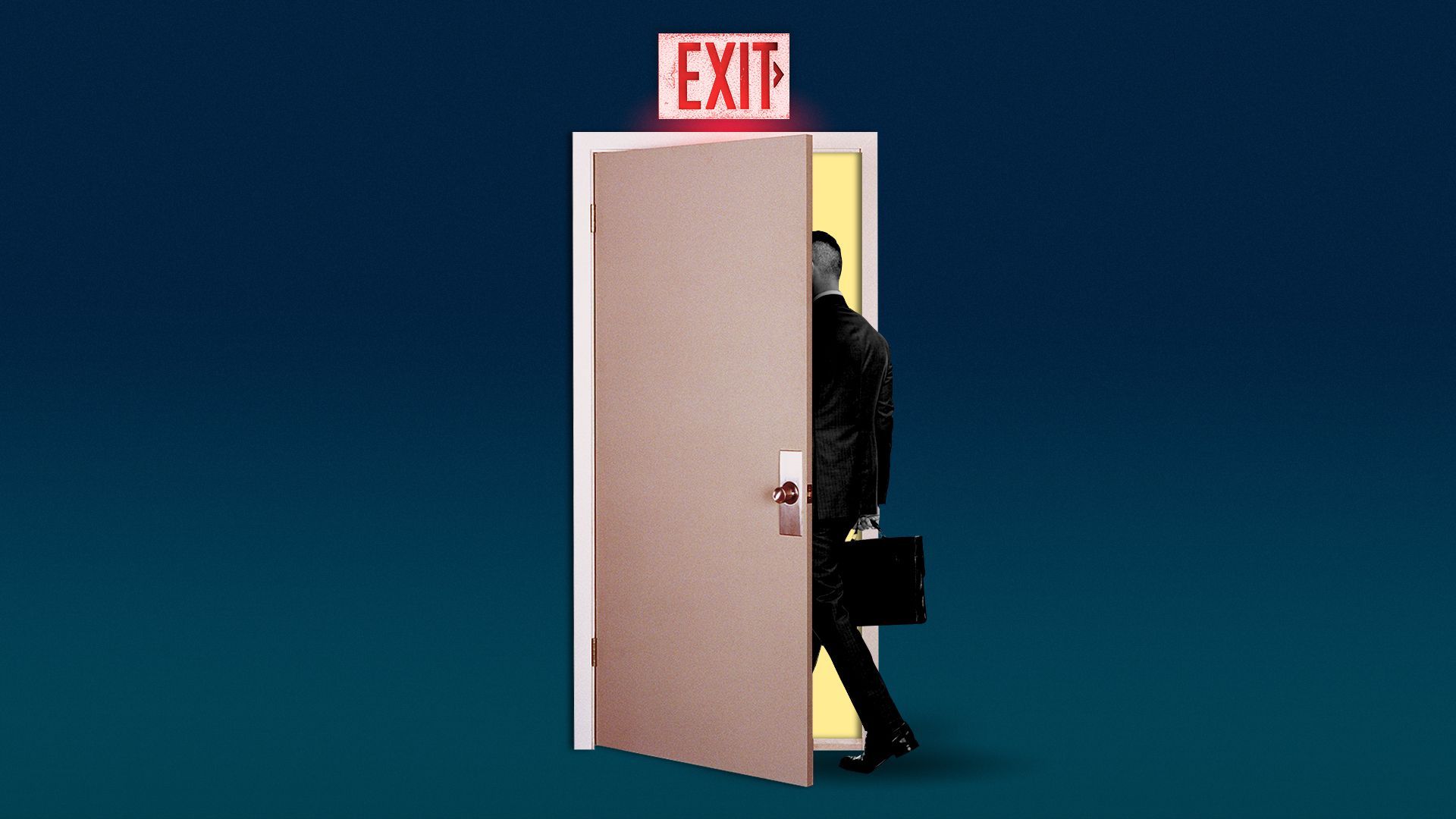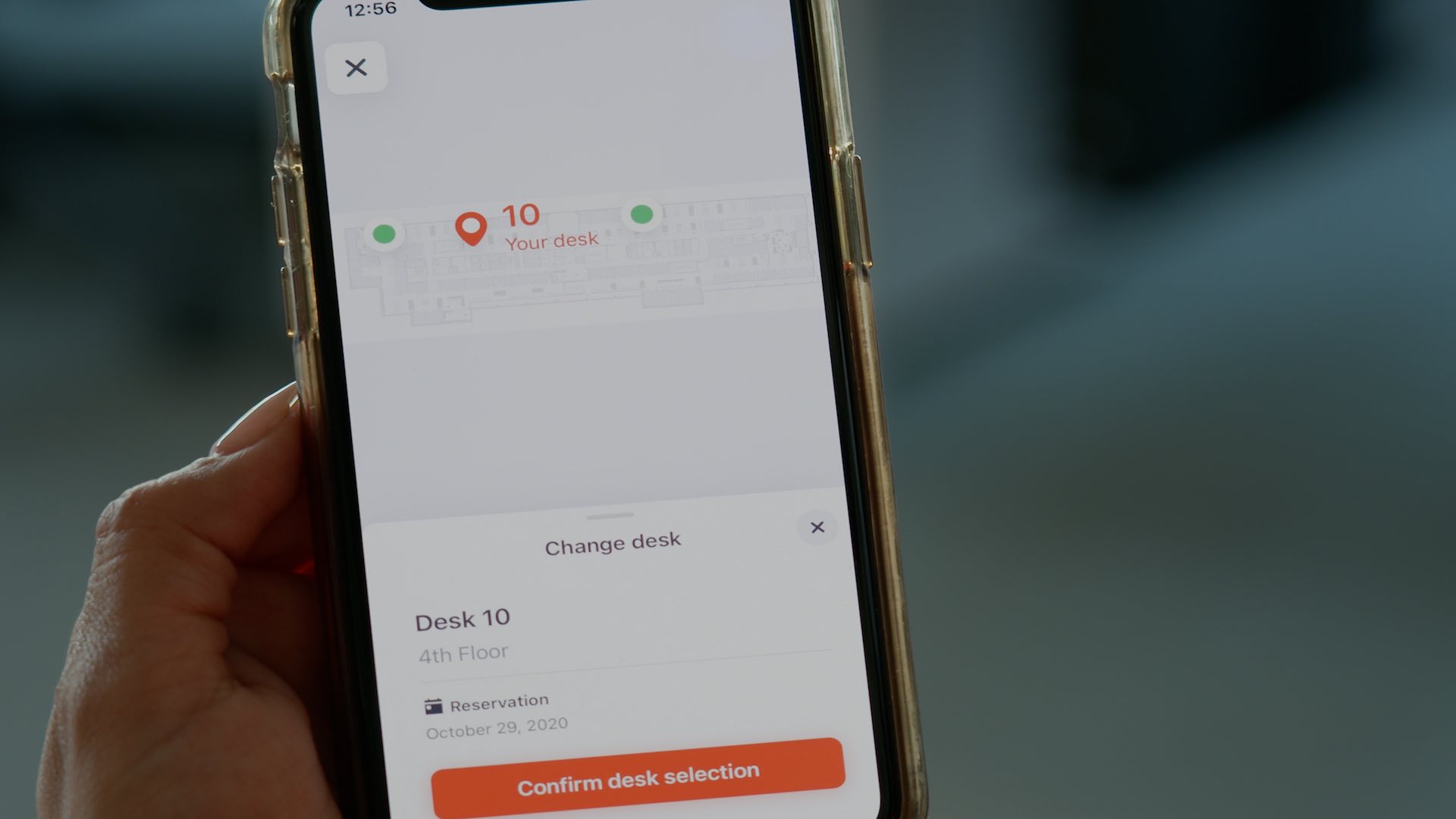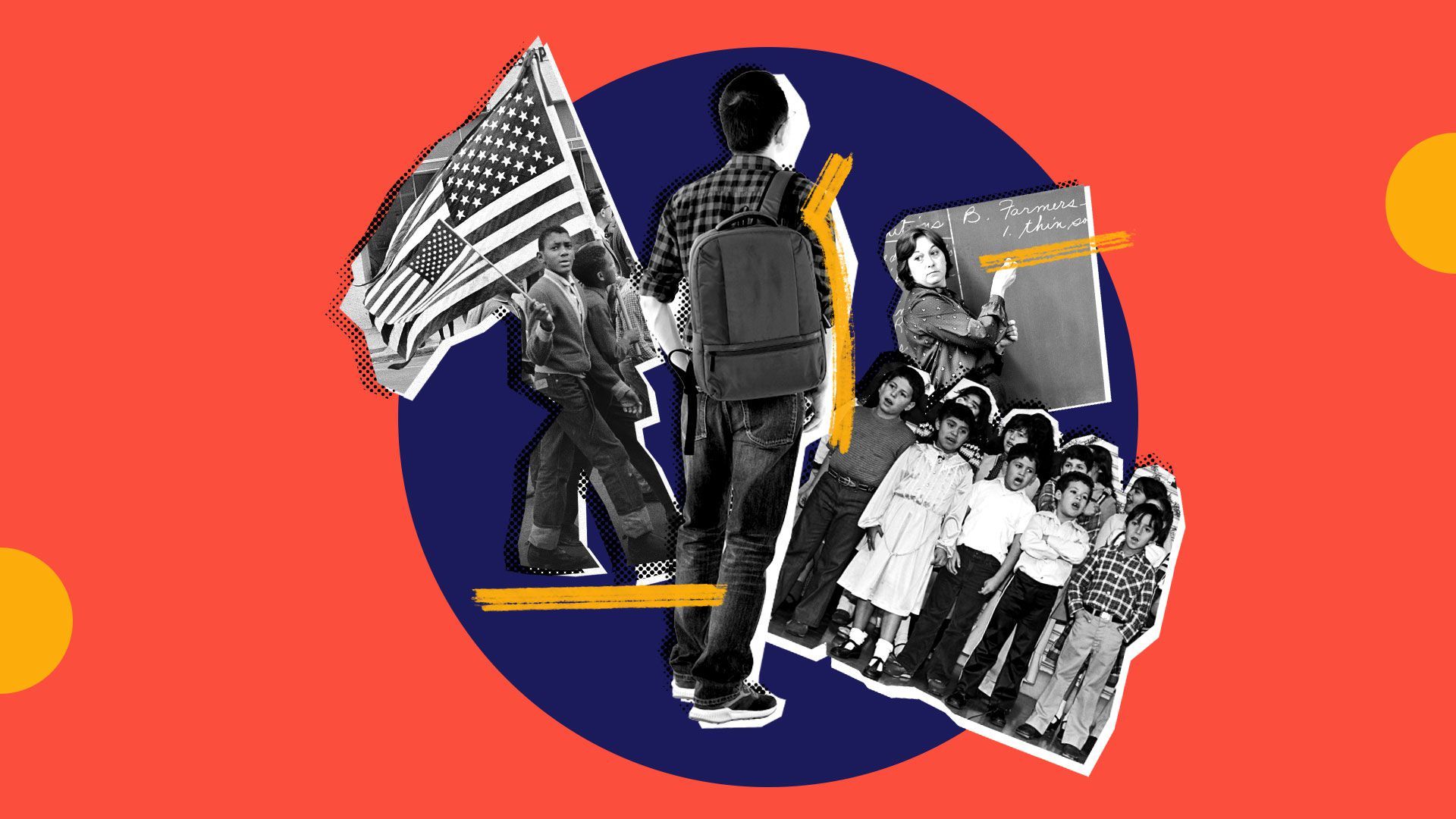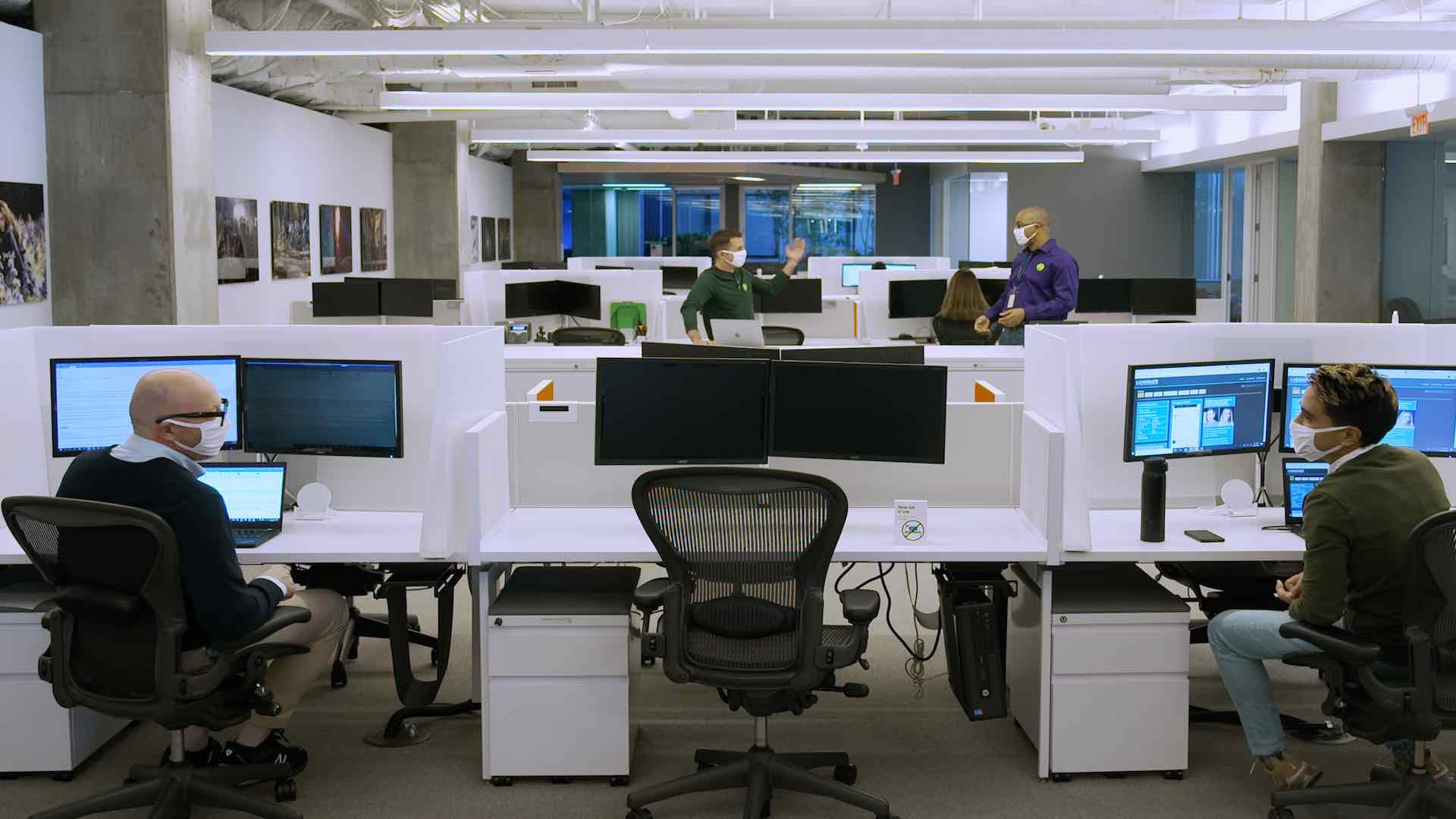| | | | | | | Presented By Envoy | | | | Axios @Work | | By Erica Pandey ·Nov 17, 2020 | | Welcome back to @Work. Keep your thoughts coming to erica@axios.com or find me on Twitter @erica_pandey. Today's newsletter is 1,431 words, or a 5-minute read. To start... | | | | | | 1 big thing: Corporate America's revolving door |  | | | Illustration: Annelise Capossela/Axios | | | | Systemic racism is leading to a turnover problem in corporate America: Companies have a hard time holding on to Black employees. Why it matters: Beyond affecting individual professionals and teams, a corporate culture that causes attrition can spread rot through entire companies. Driving the news: If companies don't pay attention to their corporate culture, the pandemic and remote work could drive the Black turnover rate even higher, experts say. - "Remote work can exacerbate the problem because there's less person-to-person contact," says Patrick McKay, a professor of human resource management at Temple University.
- In-person encounters with colleagues who don't look like you chip away at your biases, but those biases can stay strong when we're all working from home, he says.
By the numbers: - 33% of Black professionals don't feel respected or valued at work, per a recent survey from the Society for Human Resource Management. Compare that with 18% of their white counterparts.
- That pushes people out the door. According to a report from the Center for Talent Innovation, more than one-third of Black employees intend to leave their companies within two years, and Black professionals are 30% more likely to intend to leave than their white counterparts.
- At Google, which releases turnover statistics, Black employees make up less than 3% of the workforce and have an attrition rate that is 13% higher than the national average.
"There's a progression model," Derek Avery, a business professor at the University of Houston, tells Axios. "Things like microaggressions and harassment lead people to withdraw psychologically, which causes higher levels of burnout and lower levels of engagement. Then there's physical withdrawal: tardiness, absenteeism and ultimately turnover." What's happening: While many companies are trying to address the issues through implicit bias trainings or recruiting initiatives, these efforts can feel like "slapping a Band-Aid on a tumor," says McKay. - "Deep down, organizations are highly inertial," he says.
- Steps that could actually chip away at the turnover problem include adding transparency to recruiting and promotion processes, setting up ways in which employees can report discrimination, and holding aggressors accountable, McKay says. "But organizational policy infrastructures are rarely changed to support diversity."
- There are even stark differences in how workplace racism is viewed within HR departments — the very bodies tasked with addressing it. In the SHRM survey, 49% of Black HR professionals reported observing racial discrimination at work, compared with 13% of white HR professionals.
The stakes: - Black employees who get fed up and leave might have trouble finding their next job. "You look like a job hopper to potential employers," says McKay. "And they're not aware of the job climate you dealt with previously."
- And for the companies themselves, there's a lingering "secondhand smoke effect," Avery says. White employees who aren't experiencing the discrimination themselves but are routinely witnessing it are likely to feel burnout and even quit over the frayed company culture themselves.
The bottom line: It's simple. Says Avery, "If your organization is doing things that systemically run off talented people, you will, by definition, be left with less talented people." Go deeper: |     | | | | | | 2. A tax on remote work |  | | | Illustration: Eniola Odetunde/Axios | | | | There's a new idea for a tax: a tariff on the teleworkers who have the privilege of doing their jobs from home. The big picture: The rationale from Deutsche Bank, which proposed the tax in a research note, is that remote workers are not contributing as much as they were to the economy because they're not commuting or buying lunch by the office or grabbing that afternoon coffee. Details: Deutsche Bank proposes a 5% tax on remote workers who choose that way of life after it's safe to go back to work. - If employers aren't able to provide a desk for the worker, they're responsible for the tax. If they are, the workers themselves are responsible.
- Low-income and self-employed workers would be exempt.
- "On an average salary of $55,000 at a tax rate of 5%, Deutsche Bank estimates the average person would pay more than $10 a day in tax, and raise a total of $48 billion a year," USA Today's Brett Molina writes.
But, but, but: "Directly taxing work-from-home is a practical minefield," Stanford economist Nicholas Bloom tells Axios. "I can imagine a huge amount of misreporting, distortion and other problematic behavior." Still, it's a good idea to address the income inequality that has been magnified by the pandemic, he says. - "I would simply put up tax rates on top earners as they are hugely more likely to work from home," Bloom says. "This is simple. We already have the tax structure for this."
|     | | | | | | 3. Charted: There's little sign of worsening layoffs so far |  Data: Axios/Ipsos poll; Chart: Andrew Witherspoon/Axios The out-of-control coronavirus outbreak has pushed cities and states to reinstate economic restrictions, Axios' Courtenay Brown writes. The state of play: That hasn't translated into another round of widespread laid-off workers, according to the newest installment of the Axios-Ipsos Coronavirus Index. But in a sign of what may be to come, it found a slight upturn in the number of workers that said they were temporarily furloughed or laid off. - And 8% of those surveyed said their employer shut down business completely — the biggest share since August.
What they're saying: The "data points are more indicating the direction of something, more than saying the economy has screeched to a halt," says Chris Jackson, SVP of public affairs at Ipsos. The bottom line: The labor market is being monitored for signs of a backsliding recovery amid the coast-to-coast surge in COVID-19 infections and renewed lockdowns. |     | | | | | | A message from Envoy | | Envoy launches new hot-desking tool | | |  | | | | Envoy Desks is a new way to help people collaborate in person. - Users can find and book a desk using an interactive map in the Envoy app.
Why it's important: As companies adjust to a hybrid workforce, a flexible and efficient workplace is essential. | | | | | | 4. Workation gone wrong |  | | | Illustration: Aïda Amer/Axios | | | | As companies have extended their remote work timelines, work-from-home has turned into work-from-anywhere. - That's not always as glamorous as it looks on Instagram, the New York Times' Erin Griffith writes.
- Tax trouble, breakups, closed borders, unreliable WiFi and COVID guilt are turning many digital nomads' fantasies into nightmares.
What's happening: Americans have historically been terrible at taking vacations, so for many, the pandemic provided a perfect opportunity — the guilt-free workation. Take your laptop somewhere beautiful on the ocean or in the mountains and enjoy life without taking any days off from work. - But that can quickly turn into "the worst of both worlds," Griffith notes: "[The workationers] should be enjoying themselves in their new, beautiful surroundings. But they can't enjoy themselves, because work beckons. The anxious self-optimization pingpongs between 'Why aren't I living my best life?' and 'Why aren't I killing it at work?'"
And even those who do manage to enjoy themselves after stealing away are stressed dealing with the haters who raise eyebrows at people posting beach selfies while unemployment rates and coronavirus cases keep climbing. - My thought bubble: I've never heard of a more "first-world problem."
|     | | | | | | 5. Worthy of your time |  | | | Photo Illustration: Eniola Odetunde/Axios. Photos: Spencer Grant, George Rose, Stephen F. Somerstein/Getty Images | | | | The hard truth about American education (Axios) - In America, it's better to be born wealthy — which often means white — than to be born smart. Family income is perhaps the strongest determinant of student success, and low income becomes an even higher barrier when it intersects with race.
How the counties with the worst unemployment voted (New York Times) - The state of the economy was a top issue for American voters this year, given the pandemic-induced recession and high levels of unemployment. On average, the counties that went for Biden suffered worse job losses than the ones that went for Trump.
Remote work will forever change Silicon Valley (Los Angeles Times) - The LA Times' Andrea Chang pulls together all of the smaller trends within the pandemic's grand experiment in remote work. A long-term embracing of telework could mean happier workers, less attrition and lower costs for businesses, and Silicon Valley tech companies have been the first to pick up on those perks.
Dressy clothes are making a comeback (Wall Street Journal) - When offices sent people home in March, most were more than happy to swap out slacks for sweatpants and stilettos for sneakers, but it's been a minute since people got to get all dolled up and fancy clothes are hot again. People are getting dressed up for Zoom meetings or putting on something nice for Sunday dinner just to break the monotony.
|     | | | | | | 6. 1 fun thing: The "recession-proof" lunch |  | | | Photo: Artur Widak/NurPhoto via Getty Images | | | | The pandemic has already shuttered around 100,000 restaurants, but, amid the carnage, pizza joints are actually thriving. - Independent pizzerias on the delivery app Slice have seen sales grow 60%, Moe Tkacik of Medium's Marker reports.
- Chains like Pizza Hut, Papa John's, Domino's and Marco's have seen surging sales, too.
- On Election Day, Los Angeles-based Prime Pizza reported a 250% increase in sales.
What's happening: There are a slew of reasons we're on a collective pizza binge, Tkacik notes. It's quick, it's easy, it's cheap, and it's perfect for stress-eating. On top of that, "pizza is one of the few genres of food that is actually more profitable than — and almost as addictive as — booze," he writes. Worth noting: While pizza is booming, salad shops — which rely on office workers stepping out for lunch — are struggling in the era of telework. - Sweetgreen and Freshii sales have plunged, and Sweetgreen just announced a second round of layoffs.
|     | | | | | | A message from Envoy | | Envoy Desks: The key to keeping workplaces safe | | |  | | | | Envoy's new hot-desking solution helps companies adapt for social distancing and allows employees to book a desk on days they work in the office, near colleagues to collaborate or a quiet spot to focus. The result: a healthy and productive team. | | | | Thanks for reading! | | | | Axios thanks our partners for supporting our newsletters.
Sponsorship has no influence on editorial content. Axios, 3100 Clarendon Blvd, Suite 1300, Arlington VA 22201 | | | You received this email because you signed up for newsletters from Axios.
Change your preferences or unsubscribe here. | | | Was this email forwarded to you?
Sign up now to get Axios in your inbox. | | | | Follow Axios on social media:    | | | | | |










No comments:
Post a Comment